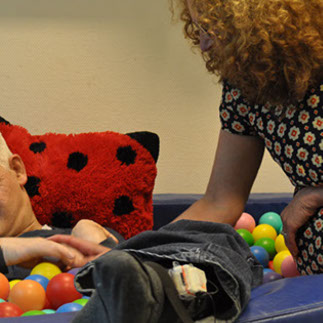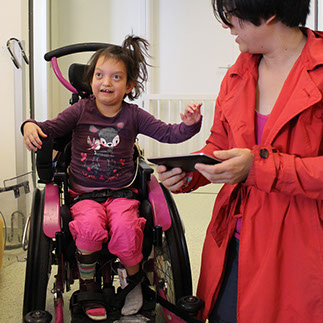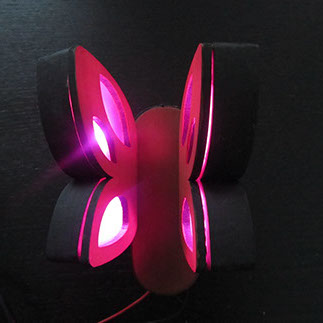Research
In the research project 'the effect of the bioresponse system for caregivers of adults with visual and severe/profound intellectual disabilities', we study whether modern technology can support professional caregivers in better understanding and responding to their client's behaviour. We evaluate the effects of the bioresponse study in a randomized multiple baseline study with a baseline, intervention and follow-up phase.
Two client-caregiver dyads from Bartiméus and two client-caregiver dyads from Royal Dutch Visio have participated in our study. Each client-caregiver dyad took part in 21 measurements (and video recordings) over a period of 5 months. During these measurements, the dyads performed three tasks: two play moments and one daily caregiving situation (having lunch or a cup of coffee).
Eight Master's students from the Vrije Universiteit Amsterdam have coded the video recordings on the caregiver's sensitivity towards the client's behaviour, the quality of the interaction between client and caregiver, and the client's challenging behaviour. Five Bachelor's students (Vrije Universiteit Amsterdam) have coded the video recordings for joint attention behaviour. At the moment, we are processing and analysing the data. Furthermore, one student is coding the video recordings on the arousal and valence of the client's behaviour. The arousal and valence scores will be compared with the sensor recording made by the smart sock. We are in the final stage of this project and expect to present the results of our study next year.
Related research
The bioresponse system is also used in the research of:
- Sien Vandesande (KU Leuven, Belgium). For more information on the project, please see: https://ppw.kuleuven.be/ogop/tklikt
- Juliane Dind, PhD, and Catherine de Blasio (Université de Fribourg, Switserland). For more information on the project, please see:
http://www.givaudan-foundation.org/projects/switzerland-children
Publications
Publications concerning the bioresponse system:
- Frederiks, K., Sterkenburg, P., Barakova, E. & Feijs, L. (2019). Supporting the interaction between persons with visual and severe/profound intellectual disabilities and their caregivers. Journal of Intellectual Disability Research, 63(7, special issue: Future4All), 704.
- Frederiks, K., Sterkenburg, P., Barakova, E., & Feijs, L. (2019). The effects of a bioresponse system on the joint attention behaviour of adults with visual and severe or profound intellectual disabilities and their affective mutuality with their caregivers. Journal of Applied Research in Intellectual Disabilities, 32(4), 890-900.
- Sterkenburg, P., Frederiks, K., Barakova, E., Chen, W., Peters, P. & Feijs, L. (2017). A bioresponse system for caregivers of adults with severe or profound intellectual disabilities. Journal of Mental Health Research in Intellectual Disabilities, 10(Suppl. 1), 121-121.
- Gijzen, T. (2015). Slimme sok pikt signalen cliënt op. Klik, 5,
12 - 14
The bioresponse systeem is developed from the Sense system, which is designed for parents of children with the Prader-Willi syndrome. The following two scientific publications concern the Sense system :
- Frederiks, K., Croes, M., Chen, W., Bambang Oetomo, S., & Sterkenburg, S. (2015). Sense – a biofeedback system to support the interaction between parents and their child with the Prader-Willi syndrome: A pilot study. Journal of Ambient Intelligence and Smart Environments, 7(4), 449-459.
- Frederiks, K., Croes, M. (2014). Biofeedback System For Parents And Children With Prader-Willi Syndrome. ACM CHI Conference on Human Factors in Computing Systems 2014.

The sock used during a play moment

Mother and daughter using the bioresponse system while singing a song together

The Sense system - the system preceeding the bioresponse system

© 2018
Eindhoven University of Technology
Vrije Universiteit Amsterdam
|
|
Department of Industrial Design
Department of Behavioural and Movement Sciences
|
|
Future Everyday group
Clinical Child andFamily Studies section



